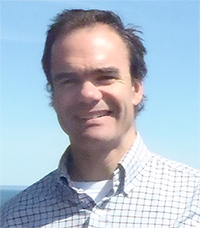
Joseph M. Hall Jr.
Associate Professor of History
Associations
History
Pettengill Hall, Room 113
Environmental Studies
About
B.A., Amherst College; Ph.D., University of Wisconsin-Madison
I teach courses about colonial North America, the United States’ War for Independence, environmental history, and Native American history. My newest class is a course about revolutionary America (the hemisphere, not the country), that I team-teach with Karen Melvin. My favorite class is a Short Term course on the history of Wabanaki, “the people of the Dawnland.” Wabanaki include the Abenaki, Penobscots, Passamaquoddies, Mi’kmaqs, and Wolastoqiyik (also known as Maliseets) of Maine but also New Brunswick, Nova Scotia, and eastern Quebec.
My principal scholarly interests focus on Native American interactions with Europeans during the period before 1850. I have written a book exploring how European and Native American understandings of trade and gift-giving shaped the history of the Southeast between 1350 and 1740. (See the link to the book below.) Currently I am working to understand how Wabanakis cultivated their ties to their homelands even as European-American colonists dispossessed them of most of that territory. In addition, I have been involved in a couple of different public history projects that highlight the longstanding and ongoing presence of Wabanaki in this place called western Maine. All of this work is inspired by a longstanding curiosity about the contemporary relevance of the supposedly distant past. It is also grounded in a desire to collaborate with Wabanaki scholars on questions of common interest.
My love for history springs from what I saw—and overlooked—in my childhood. My hometown, Newport, Rhode Island, has long trumpeted its pre-Revolutionary past, and I loved growing up among old wood-framed homes on narrow streets. Only late in college, though, did I realize that enterprising English colonists did not settle an empty colony. Although I knew “Narragansett” as a beautiful bay and a cheap beer, I had never thought about the Narragansett people who continue to shape Rhode Island’s history. Such a late epiphany was embarrassing, but it made clear to me that the biggest blind spots about our past are frequently the ones right in front of our faces. Whatever I teach, I continue to ask questions about the stories we tell and why. I may not make every student of history into a lover of history, but I encourage people to think carefully about where they are and how they got there.
These kinds of lessons make Wabanaki history especially interesting to teach. Students are almost always surprised to learn that Maine has American Indian inhabitants, and they are even more surprised to learn that Wabanaki continue to play a prominent role in our state. The class includes visits to Wabanaki communities and requires students to present some of what they have learned to people outside of the class. In fact, the map of Wabanaki place names of western Maine was developed from research by students who took the class in 2012 and 2014. I hope through projects like these that it is possible for students to avoid some of the blind spots that have clouded my own understanding of the world.
Classes:
- American Indian History
- Origins of New Nations, 1500-1820
- Revolutionary Americas, 1765-1830
- US Environmental History
- Wabanaki History in Maine
- Native American History
Expertise
Current Courses
Fall Semester 2025
Senior Thesis
This course involves research for and writing of the senior thesis, under the direction of a faculty advisor. Guidelines for the thesis are published on the program website and are available from the program chair. Students register for ENVR 457 in the fall semester.
Revolutionary Americas, 1750-1848
This team-taught course looks at struggles for independence throughout the American hemisphere. From Buenos Aires to Boston, the revolutions that reshaped the Americas from 1765-1830 were as varied as the hemisphere. European men were not the only ones to claim new authority. Women claimed power men…
Historical Methods
This seminar refines students' proficiency as historians and prepares them to write their senior thesis. The course is designed around two interrelated goals. First, students analyze how different approaches to history and sources matter to understandings of the past. Second, students design and tes…